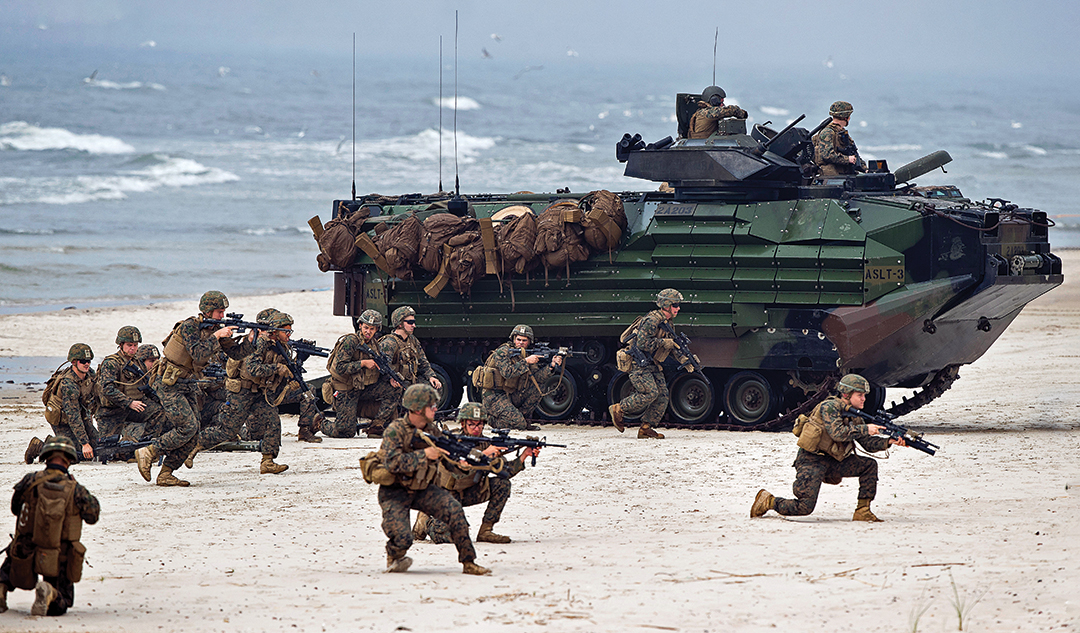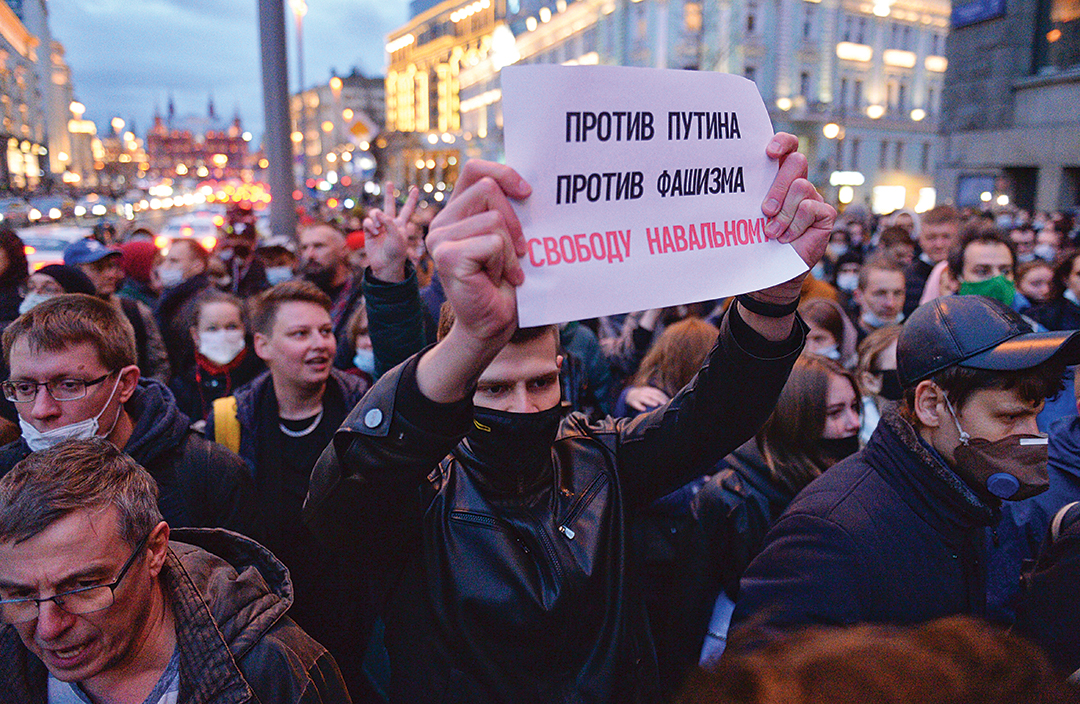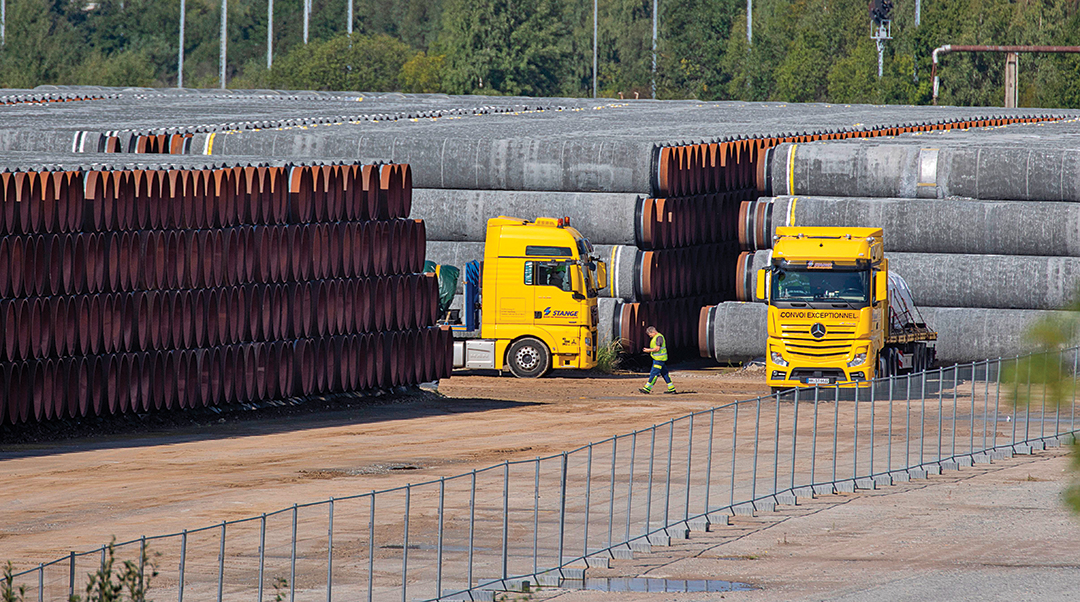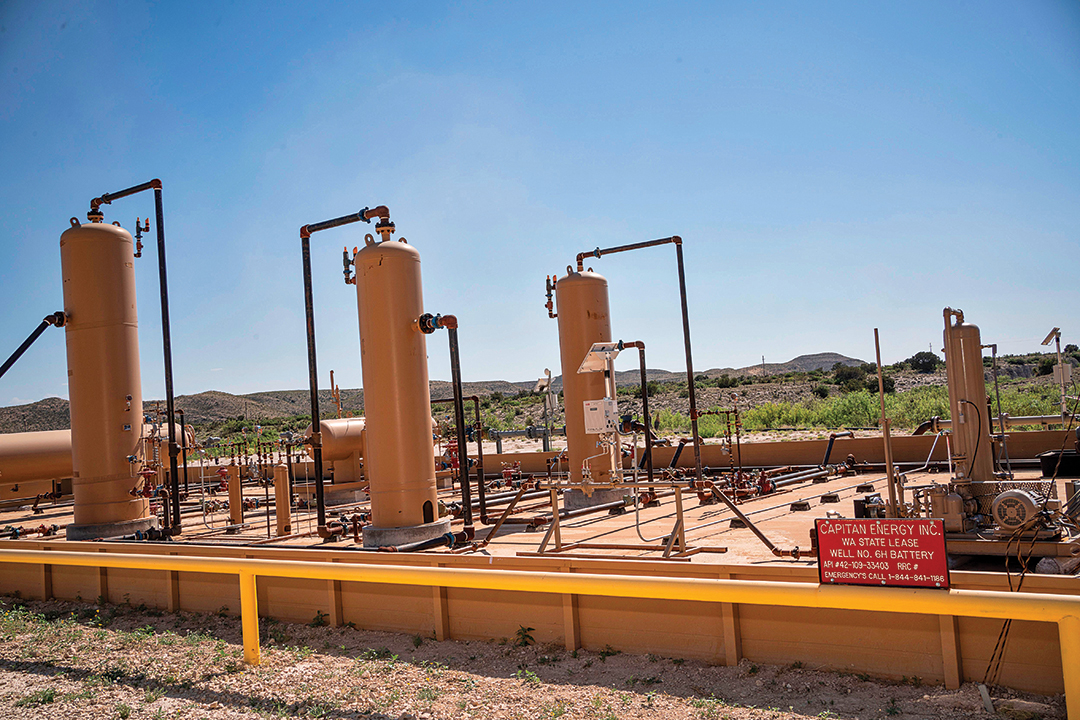By Dr. Nika Chitadze, professor, International Black Sea University
Amid ongoing tense relations between the United States and Russia, a telephone conversation took place on April 13, 2021, between U.S. President Joe Biden and Russian President Vladimir Putin. The two leaders discussed several regional and global issues and a number of strategic issues, including arms control and security, such as the Strategic Arms Reduction Treaty (START). Biden clarified that the U.S. will work intensively to protect its national interests in response to Russian actions, such as cyberattacks and election interference. He also underscored the unwavering U.S. commitment to Ukraine’s sovereignty and territorial integrity, voiced concern over the sudden increase of Russian military forces in occupied Crimea and on Ukraine’s eastern borders, and called on Russia to de-escalate tensions. “President Biden reaffirmed his commitment to a stable and predictable relationship with Russia in the interests of the United States and offered to meet in a third country in the coming months to discuss the full range of issues facing the United States and Russia,” the White House said in a statement.
In addition, during an interview on March 16 with ABC News, Biden criticized Russian interference in the 2020 U.S. elections. He also noted that “there are areas where working together is in our common interest,” referencing the possibility of a new START treaty. The president’s comments were preceded by the release of a U.S. intelligence report backing accusations that Russia and Iran were directly behind attempts to interfere in U.S. elections and concluded that Putin personally authorized the campaign. Meanwhile, British Foreign Secretary Dominic Raab said the British government shares many of America’s concerns about Russia and that there are currently no great reasons for optimism in relations with Moscow.
Economic and Military Comparison
Any discussion of conflict in U.S.-Russia relations requires a comparison of the two countries’ economic and military potential. Despite a decrease of 2.3%, or $500.6 billion, because of COVID-19, U.S. gross domestic product (GDP) was $20.93 trillion in 2020. By International Monetary Fund (IMF) estimates, U.S. GDP per capita was $63,051. Russia’s nominal GDP in 2020 was $1.4 trillion, and GDP per capita was $9,972.
In 2019, U.S. military expenditures exceeded $732 billion. U.S. military forces consisted of 1,359,685 active duty service members, with an additional 799,845 in the reserves, as of February 2019. As of 2019, Russia spent $65.1 billion on defense and Russian military forces numbered about 900,000 service members.

Potential Developments During the Biden Administration
Sanctions Regime
U.S. sanctions are expected to be more targeted under Biden to avoid putting pressure on the Russian opposition. Biden has repeatedly criticized Russia, accusing it of violating basic rules. The U.S. Department of Commerce announced in March 2021 that it would impose new trade restrictions against Russia. Export restrictions were expanded because the Russian government violated international law by using chemical (or biological) weapons against its own citizens. This includes the poisoning of former Russian military intelligence (GRU) officer Sergei Skripal and his daughter Yulia in the United Kingdom in 2018, as well as that of opposition leader Alexei Navalny in Russia in August 2020. “By deploying illegal nerve agents against dissidents, both inside and outside its borders, the Russian government has acted in flagrant violation of its commitments under the Chemical Weapons Convention and has directly put its own citizens and those of other countries at mortal risk,” the Commerce Department said in a statement.
The sanctions seek to prevent Russia from gaining access to U.S. dual-use technology that could be used to develop chemical weapons. The U.S. will restrict the export and reexport to Russia of equipment, technologies and software related to national security. For some categories of goods and services, particularly those related to civil aviation and the space sector, exceptions will apply.
Will the sanctions be more painful? On one hand, the Biden administration is expected to take a constructive approach to foreign policy, to arms issues and to the extension of the START III treaty with Russia. But confrontation over specific issues could intensify sanctions decisions. While sanctions policy will continue so long as the confrontation between the two countries does, Biden’s policy will be more predictable. U.S. policy will continue to pressure Moscow to change its foreign policy, which it is hoped will contribute to changing political conditions inside Russia.

The new American administration will also be more interested in what is happening in Belarus, Ukraine and Georgia and will probably work more actively in other post-Soviet countries. The U.S. position on the situation at the Russia-Ukraine border is a clear example of this. In his speeches, Biden has distinguished between the Russian people and the Russian elite, which he has referred to as a collection of autocrats and kleptocrats.
Navalny, an International Figure
When Donald Trump was U.S. president, he somewhat addressed Navalny’s persecution. For Biden and his team, this issue is much more important. Navalny is becoming a prominent figure in international politics. Supporters of the opposition initiated an active campaign in his support, but in late summer and early autumn 2020 there were only minimal demonstrations and not many people came to meet him at Vnukovo Airport in Moscow. But up to 2,000 people gathered when Navalny returned in January 2021 after recovering in Berlin from being poisoned. About 60 were detained. Russian authorities were able to control the situation with Navalny, but the future is difficult to predict. Navalny is an expression of seriously growing discontent in Russia. The more the authorities criminalize him, and as more becomes known about the methods used against him, the more popular he becomes.
Russian Counteractions
Russia will increase its military presence in the Black Sea region — on the front line between NATO and Russia. A clear example is the concentration of Russian troops near the Russia-Ukraine border. Around 300,000 military personnel are deployed in Russia’s Southern Military District, which includes the Black Sea and Caucasus regions and some southern provinces of Russia. Furthermore, according to Russian Foreign Ministry spokeswoman Maria Zakharova, Russia will respond to NATO activities in the Black Sea. Asked by reporters what Russia’s possible response would be to the strengthening of NATO’s military presence in the region, Zakharova said, “To say it briefly, in terms of ensuring our own security, the answer is traditional — we will respond adequately.”
The Kremlin needs tensions near its borders with NATO member states for leverage with the West — primarily with the U.S. — in bargaining political concessions. An example would be the West not adopting new sanctions against Russia in return for Moscow withdrawing troops from its borders with Ukraine. Furthermore, Russia will try to build relations with geopolitical and ideological rivals of the U.S. and the West, primarily China and Iran. For example, in 2018 Russia and China conducted the Vostok 2018 joint military exercises with 300,000 troops. Furthermore, since 2019 China became one of the main importers of Russian natural gas via the Sila Sibiri (Power of Siberia) pipeline, which has a capacity of 38 billion cubic meters.
Russia is expected to make efforts to strengthen economic and security cooperation within the Shanghai Cooperation Organization (SCO), which is composed of China, India, Kazakhstan, Kyrgyzstan, Pakistan, Russia, Tajikistan and Uzbekistan. It’s also worth mentioning that in March 2021, Iran and China signed a 25-year cooperation agreement in the areas of trade/economic relations and transport. Thus, the Kremlin may work to activate a Moscow-Tehran-Beijing triangle.
Russia has also been strengthening cooperation with Turkey and dividing the spheres of geopolitical influence in the Black Sea region. Trade volume between the two states reached $26.3 billion in 2019 (for Turkey: $3.85 billion in exports and $22.45 billion in imports). Furthermore, the TurkStream natural gas pipeline was inaugurated in January 2020. Thus, through the Blue Stream and TurkStream pipelines, Russia is a major supplier of natural gas to Turkey. Emphasizing economic relations, Moscow will try to persuade Ankara to limit Western military presence in the Black Sea. Despite its membership in NATO, Turkey takes full advantage of the Montreux Convention, which restricts Black Sea passage of military ships from nonlittoral states to 21 days.

The Kremlin will likely continue to present new initiatives in the framework of the informal BRICS (Brazil, Russia, India, China and South Africa), whose members contributed about 33% of global GDP in 2019. However, BRICS is not a monolithic entity. For example, Brazil certainly, and South Africa are closer to the West on many geopolitical issues than they are to China or Russia. On the other hand, Brazil intends to strengthen its leadership position in Latin America and is a full member of the South American regional organization Mercosur, which was founded partly to decrease U.S. geopolitical and economic influence in the region. South Africa actively cooperates with other African states within the African Union, one of the main purposes of which is to increase the influence of the countries of the Global South in world politics and the world economy. As for India, it has been moving much closer to the West, and the India-China rivalry is especially bitter. At the same time, India (together with Pakistan) joined the Russia- and China-led SCO in 2017. Russia is also India’s primary supplier of military armaments.
Based on the above-mentioned factors, some analysts believe that the BRICS nations would like to decrease the influence in the world economy and politics of Western democratic states and institutions. For example, one of the main purposes of BRICS is the foundation of a development bank, with authorized capital of $100 billion, which can be considered an alternative to the World Bank Group.
Preventing Activation Of Anti-Western Forces On Behalf Of Russia
Geopolitical Factors
To extend the reach of democracy and counteract anti-Western forces, democratic states — under U.S. leadership — should strengthen their strategic positions and prepare to resist various nondemocratic forces. A common strategy is necessary to hinder cooperation and unification of antidemocratic forces. In this regard, the West should provide for and promote cooperation and unity among the countries of the Global North, especially between North America and Europe. For example, there should be discussions on forming a common economic market and determining a common strategy for relations with anti-Western entities, such as the SCO. Support for international institutions, such as the IMF, the World Bank, the World Trade Organization and the Organisation for Economic Co-operation and Development, should be strengthened to legitimize Western interests and attract non-Western states to those institutions.
The West should offer maximum support to the implementation of democratic reforms and promote the integration into Western democratic institutions to those states whose foreign and national security policies prioritize closer relations. For example, a consensus should be built to admit Georgia and Ukraine into NATO and for their further integration into European structures. These two former Soviet republics would benefit from closer relations with the European Union and NATO. It is estimated that a free-trade regime between Georgia and the EU would increase Georgia’s GDP by 4.3% annually. It would also set an example for other post-Soviet republics, which would increase incentives among those states to implement democratic reforms and further cooperate with the U.S. and the EU. In this case, the process of democratization could cover about one-sixth of the planet — the entire post-Soviet space.
Transforming NATO and the EU
To increase Western influence and spread democracy, it is necessary to provide security in different regions of the world. Here, NATO and the EU should have important roles. They are international, regional communities of democratic states, based on common values: superiority of the law, and respect and protection of fundamental human rights. Furthermore, taking into consideration the limited resources of the United Nations and problems related to how the U.N. makes decisions on peace and security measures, increasing the roles, functions and geographical area of NATO and EU activities is warranted. For example, NATO was the main guarantor of peace and security, and prevention of genocide and mass human rights violations, in the Balkans conflicts (Bosnia-Herzegovina, Kosovo, North Macedonia). Furthermore, NATO member states took the decisive role in combating terrorism and in peacekeeping operations in Afghanistan and Iraq.

Since the signings of the Maastricht and Lisbon treaties, and also the NATO-EU Berlin Plus Agreement in 2003, the EU’s role in defense and security has significantly increased. The EU has been in charge of the peacekeeping operations in Bosnia-Herzegovina and North Macedonia since 2005 (when EU forces replaced NATO forces), Moldova and Ukraine (since 2005), Georgia (the EU Monitoring Mission following the Russia-Georgia war in 2008), the Palestinian territories (since 2006), and in Africa (Central African Republic, Mali, Somalia, Libya and Niger).
Due to these realities, a close partnership of democratic states from around the world should be established to advance joint actions to combat terrorism and conduct peacekeeping and peace-building operations. Special attention should be paid to promoting partnerships with nations such as Australia, Japan, New Zealand, South Africa and South Korea.
Information Campaign
Various radical groups work to spread geopolitical disinformation (including 10,000 websites) about countries from the Global North, especially the U.S. For example, most people from the countries of the Global South consider exploitation of poor states by rich states to be the primary cause of socioeconomic problems in their countries. Also, due to propaganda from radical and fundamentalist Islamic groups, many Muslims believe that the West is conducting a war on Islam.
Taking these factors into account, it is important to develop (perhaps within the Group of Seven or within the EU) focused strategies and tactics for maximizing the use of mass media and information technologies to counter disinformation and disseminate positive messages about how the U.S. and international democratic society are fighting poverty, misery, unemployment and corruption in developing countries.
The Importance of Energy
Most international economic activity depends on energy, primarily the extraction and trade of oil and natural gas. Countries possessing large energy reserves should logically have strong economic and political bargaining positions in the world economy. Thus, energy security is critical. Energy-rich authoritarian regimes can be weakened if democratic states are able to decrease their dependence on energy from those countries, making the authoritarian regimes more accountable to international democratic standards, decreasing their imperialistic ambitions (in the case of Russia) and pressuring them to implement democratic reforms.
For a historical example, in the 1980s Washington convinced its partners in the Middle East that the best way to influence the Soviet Union and make the Kremlin decrease its imperialistic ambitions, thus improving international security, was to undermine the Soviet economy by pushing down international oil prices. In 1985, the U.S. and Saudi Arabia negotiated a threefold increase in Saudi oil production, resulting in the price of oil falling from $28 to $10 per barrel. Given that one of its main revenue sources was the export of “black gold,” the drop in oil prices caused the Soviet budget deficit to increase fivefold by 1988. As a result of the economic crisis and to decrease defense costs, the Soviets agreed to withdraw their armed forces from Afghanistan (and later from Eastern and Central Europe), and to the unification of Germany. Ultimately, it caused the collapse of the world communist system and the end of the Cold War.
U.S.-EU Energy Cooperation
The U.S. and Europe can cooperate in energy policy by successfully implementing various energy projects to bypass Russia and by shifting energy consumption to alternative sources. This will establish a base for promoting international peace and stability by significantly reducing the influence of authoritarian states in world politics and will force those states to consider the implementation of democratic reforms domestically.
The U.S. strategic oil reserve has gradually lost its importance for U.S. national and energy security during the shale gas revolution. Increasing U.S. energy production and independence depresses international energy prices, which negatively affects the positions of several authoritarian regimes that possess important reserves of oil and gas. For example, according to some Russian economists, economic sanctions and decreasing oil prices will cost the Russian economy about $570 billion.

The development of the U.S. natural gas industry and decrease in oil consumption and imports is notable. In 2005, 60% of U.S. oil demand was satisfied by imports. By 2013, imports accounted for just 35%. And U.S. imports of natural gas decreased 32% from 2005 to 2013, which also caused a decrease in the U.S. foreign trade deficit. Taking into account that exports of natural gas to Europe (150-200 billion cubic meters annually) bring Russia 400 billion euros per year, the export of U.S.-produced shale gas to Europe should be considered.
Economic Integration
Integrating the American and European markets within the framework of the Trans-Atlantic Trade and Investment Partnership program would create a huge, unified market of more than 800 million people. The daily volume of trade between the U.S. and Europe is currently about $3 billion.
Relations With Developing Countries
According to the World Bank Group, the combined stock of developing countries’ external debt was $5.5 trillion in the 2010s. In this regard, various intergovernmental organizations (U.N., EU), international summits (G-7, Davos Forum) and international financial institutions (World Bank Group, IMF), where most of the decision-making process of economically rich countries is conducted, should include discussions on the gradual forgiveness of the foreign debt of most countries in Africa, Asia, Latin America and the Pacific. In return, these countries from the Global South, with the assistance of wealthier, democratic states and international institutions, would take responsibility for the democratization of their political systems, economic reform and fighting corruption.


Comments are closed.